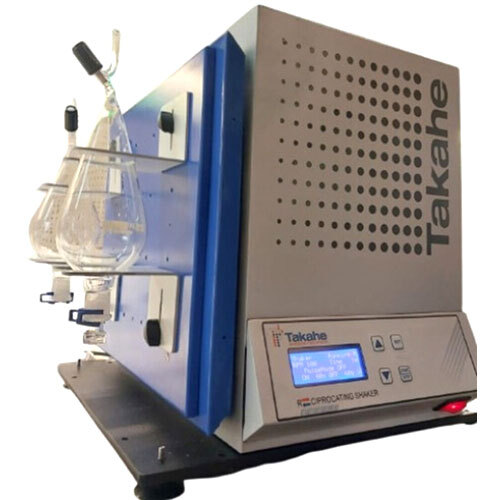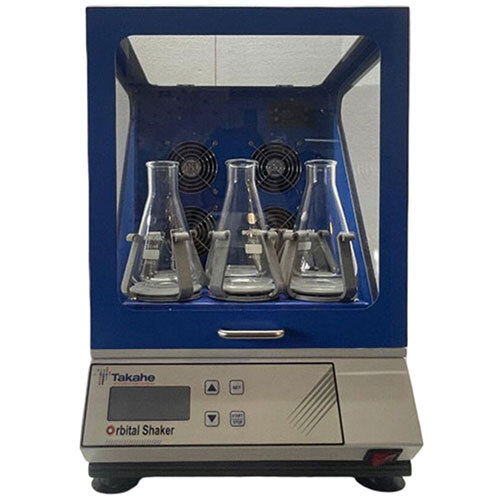Talk to us
Reciprocating Shaker with Separating Funnel
MOQ : 10 Units
Reciprocating Shaker with Separating Funnel Specification
- Features
- Time, RPM, Pulse Time (ON time as well as OFF time, both are adjustable) all are user selectable. BLDC high wattage motor is used for low maintenance, and noise. Gentle start ensures there is no sample spillage. These Free-Standing Shakers can be mounted with an incubator to maintain temperatures for the process.
- Speed Range
- 15 to 50mm
- Display Type
- LCD
- Power Supply
- 230
- Control Type
- Microprocessor
- Type
- Funnels
- Dimension (L*W*H)
- 40X40X17 Centimeter (cm)
- Product Type
- Shaker
- Color
- White Blue
- Voltage
- 230 Volt (v)
- Capacity (Ltr)
- 1000 Milliliter (mL)
About Reciprocating Shaker with Separating Funnel
Laboratory shakers are very important equipment that offer regular oscillating motion to mix, agitate, or incubate specimens in different vessels like test tubes, flasks, and microplates. They are used in biological, chemical, and pharmaceutical research, in such industries as food processing, cosmetics manufacturing, and environmental tests. In biotechnology and pharmaceutical labs, an effective and consistent shaker is essential in preparing and analysing samples. Our laboratory shakers are designed to provide high functionality and accuracy that will enable you to guarantee good and repeatable results. To be produced in India, these shakers are of superior quality in terms of features, which makes them better to use and to rely on. They have a digital RPM display to enable real-time monitoring, a user-friendly programmable controller, and a flexible platform that easily accommodates different types of laboratory glassware.
FAQs:
1. What is the benefit of a laboratory shaker in increasing the consistency of experiments?
A laboratory shaker will give uniform motion to samples, such that the sample is mixed properly (without sedimentation). This has been found to be consistent and improves the accuracy and reproducibility of the experimental results.
2. Are these shakers specific to the application?
Yes, our shakers are programmable and provide the user with the ability to set parameters (orbital length, amplitude, velocity, and pulse timing) on the site, and so are versatile across a broad spectrum of laboratory activities.
3. What kind of motor is installed in these shakers, and why?
Our motor is a high-wattage BLDC (Brushless DC) motor, which is quiet in operation, has minimum maintenance, and has a higher service life as opposed to traditional motors.
4. Do you have a laboratory shaker that can be used in temperature-controlled experiments?
Absolutely. These free-standing shakers may be attached to an incubator, and the temperature of the process can be accurately maintained, such as in cell culture or in an enzyme reaction.
5. What is the effect of the gentle start feature when starting?
The soft start system increases the speed of shaking slowly to avoid sudden jerking that may result in the spillage or imbalance of the sample, making the operation safe and stable.

Tell us about your requirement

Price:
Quantity
Select Unit
- 50
- 100
- 200
- 250
- 500
- 1000+
Additional detail
Mobile number
Email
More Products in Funnel Shaker Category
Orbital Incubator Shaker
Price 185000.0 INR / Unit
Minimum Order Quantity : 1 Unit
Speed Range : 10 to 300RPM
Voltage : 230 Volt (v)
Features : Available with compliance documents. User adjustable orbit length (amplitude). Time, RPM, Pulse Time (ON time as well as OFF time, both are user selectable. BLDC high wattage motor is used for low maintenance, and noise. Gentle start ensures there is no sample spillage. Easy Installation and operation Aluminium Sample Platform for rust control Incubator temperature selectable controlled chamber Easy Mounting and Removing of labware design Maintenance Free
Power : 230 Volt (v)

 Send Inquiry
Send Inquiry



 English
English Spanish
Spanish French
French German
German Italian
Italian Chinese (Simplified)
Chinese (Simplified) Japanese
Japanese Korean
Korean Arabic
Arabic Portuguese
Portuguese